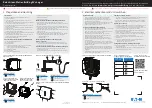
239
Car care and technical information
Tire Chains
Notice:
If your vehicle does not have
P225/45R17 size tires, use tire chains
only where legal and only when you
must. Use only SAE Class ²S² type
chains that are the proper size for your
tires. Install them on the front tires and
tighten them as tightly as possible with
the ends securely fastened. Drive slowly
and follow the chain manufacturer’s
instructions. If you can hear the chains
contacting your vehicle, stop and
retighten them. If the contact continues,
slow down until it stops. Driving too fast
or spinning the wheels with chains on
will damage your vehicle.
If a Tire Goes Flat
It’s unusual for a tire to “blowout” while
you’re driving, especially if you maintain
your tires properly. If air goes out of a tire,
it’s much more likely to leak out slowly. But
if you should ever have a “blowout”, here are
a few tips about what to expect and what to
do:
If a front tire fails, the flat tire will create a
drag that pulls the vehicle toward that side.
Take your foot off the accelerator pedal and
grip the steering wheel firmly. Steer to main-
tain lane position, and then gently brake to
a stop well out of the traffic lane.
A rear blowout, particularly on a curve, acts
much like a skid and may require the same
correction you’d use in a skid. In any rear
blowout, remove your foot from the acceler-
ator pedal. Get the vehicle under control by
steering the way you want the vehicle to go.
It may be very bumpy and noisy, but you can
still steer. Gently brake to a stop – well off
the road if possible.
If a tire goes flat, the next part shows how to
use your jacking equipment to change a flat
tire safely.
WARNING
If your vehicle has P225/45 R17 size tires,
don’t use tire chains, there’s not enough
clearance.
Tire chains used on a vehicle without the
proper amount of clearance can cause
damage to the brakes, suspension or
other vehicle parts. The area damaged by
the tire chains could cause you to lose
control of your vehicle and you or others
may be injured in a crash.
Use another type of traction device only if
its manufacturer recommends it for use
on your vehicle and tire size combination
and road conditions. Follow that manu-
facturer’s instructions. To help avoid
damage to your vehicle, drive slowly,
readjust or remove the device if it’s con-
tacting your vehicle, and don’t spin your
wheels.
If you do find traction devices that will fit,
install them on the front tires.
Содержание 2004 9-5
Страница 10: ...10 This page has been left blank ...
Страница 39: ...39 Security Security Doors _________________ 40 Central locking _________ 40 Car alarm ______________ 46 IB446 ...
Страница 52: ...52 Security This page has been left blank ...
Страница 198: ...198 Starting and driving This page has been left blank ...
Страница 262: ...262 Car care and technical information This page has been left blank ...
Страница 268: ...268 Customer Assistance and Information This page has been left blank ...
Страница 288: ...288 Index Notes ...
















































